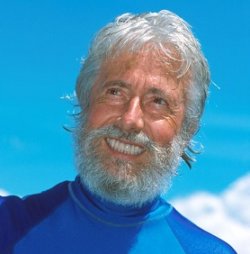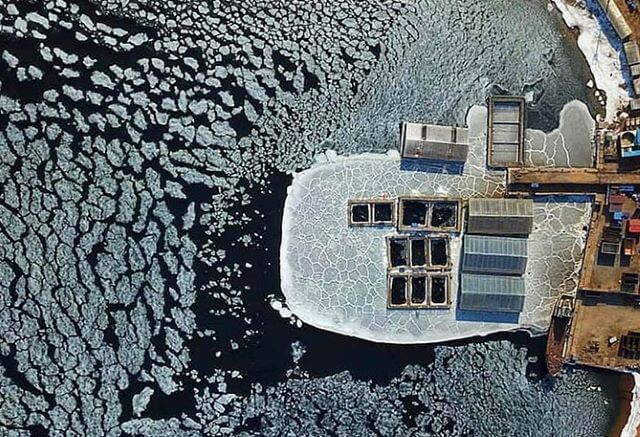The Whale Sanctuary Project is organizing a team of experts from non-profits and other NGO’s to go to Srednyaya Bay in Primorsky Region on the Far East coast of Russia and assess the condition of the orca and beluga whales being held there.
 Jean-Michel Cousteau, explorer, environmentalist and special advisor to the Whale Sanctuary Project, has been invited by the Governor of the Primorsky Region to visit the notorious so-called “whale jail,” where 10 orcas and 87 belugas are languishing in icy sea pens.
Jean-Michel Cousteau, explorer, environmentalist and special advisor to the Whale Sanctuary Project, has been invited by the Governor of the Primorsky Region to visit the notorious so-called “whale jail,” where 10 orcas and 87 belugas are languishing in icy sea pens.
The team is prepared to travel to Srednyaya Bay as soon as approval is given by the federal government.
The mission will be to take stock of the whales’ health and to advise Russian authorities on a plan to rehabilitate them and to assist in preparing the whales to be returned to open ocean waters where there is sufficient prey.
Simultaneously, members of our Board and Advisors, including Naomi Rose, Ingrid Visser, Don Baur, Heather Rally, Jeff Foster, Katy Foster, and Lori Marino have been participating in a letter from scientists, coordinated by Mark Palmer of Earth Island Institute, that presents the scientific evidence against keeping these whales in captivity. They have included numerous scientific papers to provide data to Russian leaders.
The whales were captured from the Sea of Okhotsk, on the east coast of Russia, by a group of companies who reportedly intended to sell them to entertainment parks in China. (A single orca can fetch more than $6 million in the booming Chinese theme park industry.)

Worldwide outrage at the treatment of these whales has been growing since the time the first whales were captured last summer. In January, Cousteau, Charles Vinick of the Whale Sanctuary Project, David Phillips of Earth Island Institute (and Whale Sanctuary Project board member), and Roger Payne of Ocean Alliance sent a letter to President Putin, commending the Russian Government for prohibiting the sale of these whales to China and offering assistance in the release. The Governor of Primorsky Region responded with an invitation for Jean-Michel Cousteau to come to the Region.
Well-known personalities have joined the campaign to save the whales. In February, actor Leonardo DiCaprio, who has worked with President Putin on other wildlife projects, asked his followers on Twitter to “join me in speaking out against the inhumane capture of orcas and belugas in Russia” by signing a petition on Change.org. The petition has so far garnered more than a million signatures.
On March 1st, Kremlin spokesperson Dmitry Peskov said that Putin had “made the relevant order” and that the President hoped “the problem around the killer whales will be resolved in a very short time and that they will be released.”
In response to this news and to the public invitation from Oleg Nikolayevich, Governor of the Primorsky region, Cousteau sent him a personal letter, offering his assistance.
“We hope that our experience can assist the Russian government and scientific community develop and implement a plan for the cetaceans in Srednyaya Bay,” he wrote to the Governor. “I strongly believe that the best outcome for the orcas and belugas is to be rehabilitated and returned to the wild, not to be committed to a life in captivity in aquariums. I and my team stand ready to assist Russian authorities to make a successful return of the orcas and belugas to the wild a reality.”
Cousteau and Vinick have worked together on many projects on behalf of marine life, with Vinick serving for more than 25 years as Vice President of Ocean Futures Society and the Cousteau Society. So, together, with the team, they formulated the plan to travel to the Primorsky Region and provide assistance for the release of the whales. The team they have assembled will include:
- Jean-Michel Cousteau, oceanographer, environmentalist;
- Charles Vinick, Executive Director of the Whale Sanctuary Project (WSP) and senior advisor to Cousteau;
- Jeffrey Foster, WSP marine mammal expert and researcher, rehabilitation and release specialist;
- Ingrid Visser, PhD, marine mammal scientist and orca research, rehabilitation and release specialist, and WSP Advisory Group member;
- Katy Foster, WSP marine mammal researcher, rehabilitation and release coordination and documentation;
- Grigoriy Arkad’evich Tsidulko, marine mammal research specialist, expert of IUCN cetacean working group; former beluga whale trainer;
- Tatyana Evgenyevna Denisenko, Veterinarian, Assistant Professor in the Department of Microbiology of the K.I. Skryabin Moscow State Academy of Veterinary Medicine and Biotechnology;
- Tatiana Beley, Director and co-founder of “Delfa Center” and specialist in dolphin rescue and release.
The health and wellbeing of the whales has been declining by the day. Three of the belugas and one orca are no longer present in their tanks and are assumed by observers to have died.
Also, most, if not all, of these orcas and belugas are young. So, they will need to be released in waters where adult members of their populations are likely to be and where there is sufficient food for them.
In addition to the evaluation of the health of the animals, another critical factor will be developing a safe and practical program to transport and release the whales. With 10 orcas and 87 beluga whales being held in these pens, every step in the process must be very carefully planned and implemented.
Members of our team have the necessary experience to advise the Russian authorities on the preparation and initiation of such a plan. But Cousteau is emphasizing that time is of the essence if the whales are to be restored to a healthy condition so that they can be released to the open ocean.
Next: The Whale Jail in Srednyaya Bay
1 Comment
The Animal Interfaith Alliance in Britain thanks you all for the work you are engaged in to help these captive cetaceans.
You can rely on us to support your efforts, and we hope that your letter to the President, signed by so many specialists in the field, will have its effect.